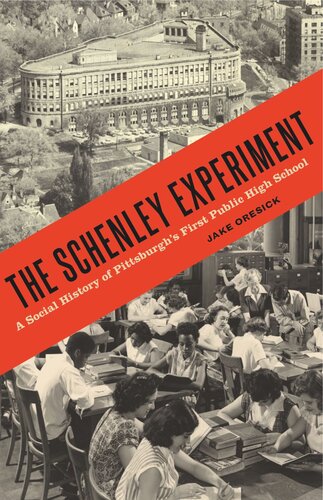

Most ebook files are in PDF format, so you can easily read them using various software such as Foxit Reader or directly on the Google Chrome browser.
Some ebook files are released by publishers in other formats such as .awz, .mobi, .epub, .fb2, etc. You may need to install specific software to read these formats on mobile/PC, such as Calibre.
Please read the tutorial at this link: https://ebookbell.com/faq
We offer FREE conversion to the popular formats you request; however, this may take some time. Therefore, right after payment, please email us, and we will try to provide the service as quickly as possible.
For some exceptional file formats or broken links (if any), please refrain from opening any disputes. Instead, email us first, and we will try to assist within a maximum of 6 hours.
EbookBell Team

4.0
26 reviewsThe Schenley Experiment is the story of Pittsburgh’s first public high school, a social incubator in a largely segregated city that was highly—even improbably—successful throughout its 156-year existence.
Established in 1855 as Central High School and reorganized in 1916, Schenley High School was a model of innovative public education and an ongoing experiment in diversity. Its graduates include Andy Warhol, actor Bill Nunn, and jazz virtuoso Earl Hines, and its prestigious academic program (and pensions) lured such teachers as future Pulitzer Prize winner Willa Cather. The subject of investment as well as destructive neglect, the school reflects the history of the city of Pittsburgh and provides a study in both the best and worst of urban public education practices there and across the Rust Belt. Integrated decades before Brown v. Board of Education, Schenley succumbed to default segregation during the “white flight” of the 1970s; it rose again to prominence in the late 1980s, when parents camped out in six-day-long lines to enroll their children in visionary superintendent Richard C. Wallace’s reinvigorated school. Although the historic triangular building was a cornerstone of its North Oakland neighborhood and a showpiece for the city of Pittsburgh, officials closed the school in 2008, citing over $50 million in necessary renovations—a controversial event that captured national attention.
Schenley alumnus Jake Oresick tells this story through interviews, historical documents, and hundreds of first-person accounts drawn from a community indelibly tied to the school. A memorable, important work of local and educational history, his book is a case study of desegregation, magnet education, and the changing nature and legacies of America’s oldest public schools.